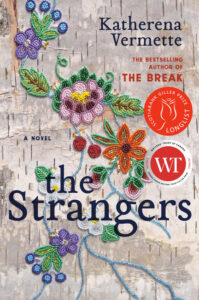October 15, 2021
The Strangers, by Katherena Vermette
How does one follow a book like Katherena Vermette’sThe Break, a fast-paced novel with a thriller’s edge that managed to wed deft plotting to high literature, a book that was so rich and satisfying, and brutal and heartbreaking at once?
Five years on, Vermette answers the question with her second novel, The Strangers (though she’s been keeping busy in the meantime releasing poetry and a graphic novel series, among other creative projects), which is billed as a “companion novel” to The Break, and has already been longlisted for the Scotiabank Giller Prize and nominated for the 2021 Atwood Gibson Writers’ Trust Fiction Prize.
The Strangers is not The Break, and though it features some of the same characters, someone looking for a similar reading experience might end up disappointed. Rohan Maitzen’s excellent review notes that the novel lacks its predecessor’s urgency: “Even as time passes in it, The Strangers doesn’t seem to be going anywhere. It ends on a faintly hopeful note, but the conclusion doesn’t feel like a resolution: it’s just the next thing that happens.”
And yet I still found the novel compelling, in the stories of Phoenix, who gives birth in detention and has to give up her baby, and Elsie, her mother, stuggling to stay sober, both of them entrenched on a system that separates women from their children, exacerbating the estrangement and broken ties that created so many of these Indigenous characters’ struggles in the first place.
On a language level, I think the book is really interesting, Elsie and Phoenix’s sections written in the the way that these characters speak, not just in dialogue, the prose not adhering to the usual rules of grammar, though in a natural, easy way that doesn’t interrupt the reading. The sections in the voices of Elsie’s mother, Margaret, and Elsie’s other daughter, Cedar, are very different, reflective of these characters different levels of education, the different company they’ve kept, underlining one of the book’s most salient points: the two people can come from the very same place and each turn out so differently. That what’s easy for one person might prove impossible for someone else.
So no, the plot doesn’t zip, but perhaps the ploddingness is not an accident, especially when you consider time from the perspective of a character counting the days since the last time she got high, or from that of a woman who’s counting down the days until she gets out of jail, trying (and failing) to overcome her violent impulses. Life itself is hardly deftly plotted, which might be the point of the entire book. Instead, it can be random, often lonely, and tragically unjust, especially for those who are marginalized.







What did phoenix commit that made her go to jail
What was she convicted of?
Read Katherena Vermette’s THE BREAK for that story….